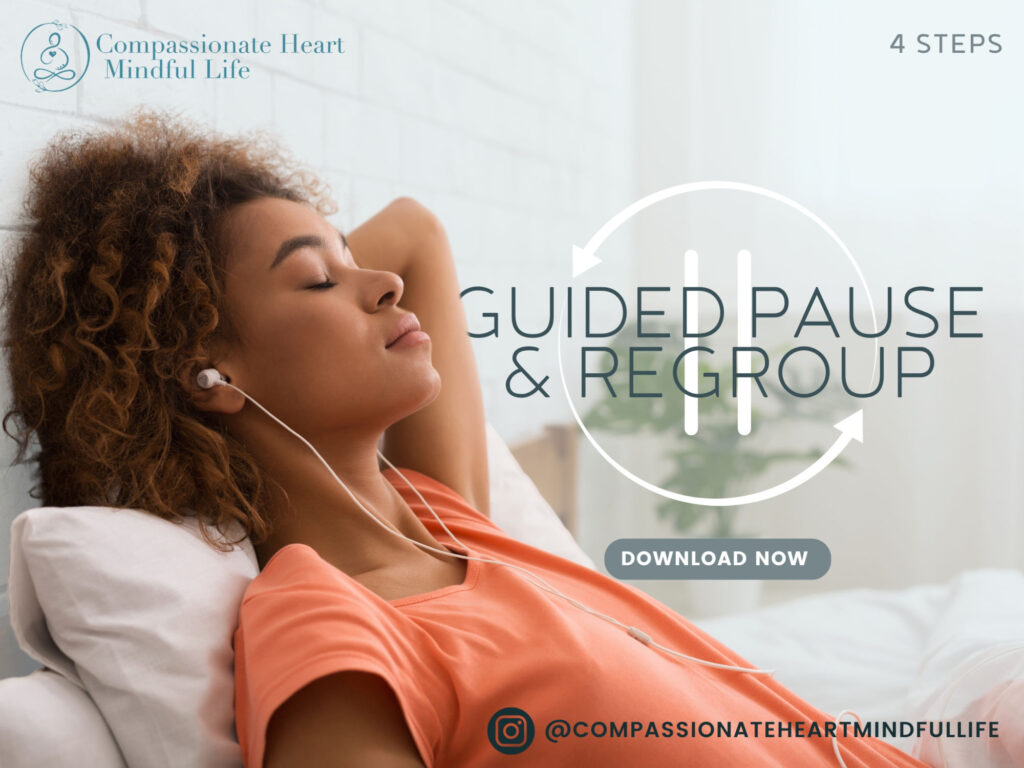It can be difficult to have compassion for our hurt parts. We may feel we should be over things that have happened in the past. We may feel we should be in more control of our emotions or our thoughts. There are many reasons people push away the idea of self-compassion, feeling that being harder on themselves will help them shift out of thoughts, feelings, and behaviors faster. Tough love, I guess. In my personal experience using self-compassion, I have found that self-compassion can heal my soul. Research is clear that self-compassion helps us shift our internal relationship with ourselves while beating ourselves up keeps us stuck and reactive.

My relationship with my kids and my partner have the greatest ability to trigger my early wounds because they are the most important people in my life. One recurring wound is feeling out of control, helpless, and alone. It was difficult for a long time to realize I had experienced secondary trauma growing up. There were periods when mental health issues swept through our house like a tornado. No one quite knew what to do or how to cope, I remember being in so much pain I regularly day dreamed about suicide as an escape. Fast forward 30 years when my kids get all amped up, struggle to listen, and are feeding off of each other it triggers this wound inside. I again feel out of control, helpless, and alone. Like a dying star, I want to collapse in on myself, but I am the adult and supposed to be taking care of my kids. After years of slowing down the reactive anger I was stuck in, I started to feel the softer, more vulnerable pain inside that was driving my anger.
I began using Tara Brach’s radical acceptance to cope in these painful moments. In Brach’s books Radical Acceptance and Radical Compassion, she suggested repeating “Yes” again and again in painful moments. The idea is to stay open to the painful feelings versus pushing it down. We tend to tense up when we are experiencing pain and try to move away from it in an effort not to feel it. Repeating yes, was like saying, “Welcome to the party pain,” “Welcome to the party feeling out of control and helpless and alone” (Thank you Jeff Warren). “I see you and care about this feeling.”
Because this is what I help people do as a therapist, move closer to their pain, the concept made sense to me, and I was willing to try anything to feel less pain. The first time I tried it, nothing much happened. I noticed a catch in my throat, and I focused on that bodily sensation, repeating, “Yes.” Eventually, it passed, and I went on with my day. The second time I tried it, my partner was around, and when I repeated, “Yes, be as big as you need to be,” big tears came. I also asked my partner to hold me, which was very unusual. Historically, I could never ask to be held when I was experiencing these kinds of painful emotions. I would stand there in pain, feeling alone, and be angry with him for not coming toward me. This time I could ask for what I needed. A memory came to the surface of sitting in my room alone as a teenager and being in so much pain I was having suicidal thoughts. I imagined holding my younger self and letting her cry in my arms as I cried in my partner’s arms.
Our most important relationships have direct access to our most painful past hurts. It’s normal to get triggered by our kids and our partner because we become flooded with emotions from unhealed wounds. Mindfulness helps us be more aware of these wounds when and how they get triggered. Self-compassion gives us the ability to feel what would otherwise be too painful and turn towards ourselves with support, love, and compassion we’ve always needed.
Disclaimer: This experience was after years of therapy and having similar experiences in therapy. I don’t know that I would have had this experience without that other support and previous experiences in my life. What was helpful was that I could take what I had learned and experienced in therapy and continue the healing at home.
Quick Win:
Journaling Prompt: Can you identify any hurt parts from previous or early experiences that get triggered in your current relationships with your kid(s) or partner? What would it be like to acknowledge those hurts parts when they get triggered and turn toward them with self-compassion? What might you want to say or do? How might you imagine comforting that hurt part inside?
Thank you so much for listening. Be Well!

I have a free gift for you, our 4 step Guided Pause & Regroup, a free audio pause for when you are about to lose or have just lost it with your kids and you need a moment to regroup. Find the audio download in the links. I created this Guided Pause & Regroup because it is exactly what I needed when I was struggling with anger and yelling in parenting.
